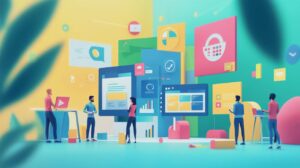Your Download Directory Complete Guide to Online Resources: Mastering Government Information Websites and Academic Databases
In an age where information has become more accessible than ever before, navigating the vast landscape of digital resources can feel rather overwhelming. Whether you are a student embarking on your first research project, an academic seeking obscure references, or simply someone curious about the wealth of knowledge available online, understanding how to locate and utilise reliable sources is essential. This comprehensive guide aims to demystify the process of accessing government information websites, academic databases, and a myriad of other digital repositories that can transform the way you conduct research and access scholarly content.
Navigating Digital Libraries and National Archives: Your Gateway to Research Excellence
The digital transformation of libraries and archives has revolutionised how we access historical documents, scholarly articles, and government records. At the forefront of this evolution stands the British Library, which offers an extensive guide to free electronic resources curated by their experts. These e-resources encompass a diverse array of formats, from online encyclopaedias and digital libraries to comprehensive archives of newspapers and journals. The resources are conveniently organised via an A-Z list or by subject, making it straightforward to locate precisely what you need. Additionally, these materials are integrated into the British Library's interim catalogue, which consolidates access to their vast collection. The library itself, situated at 96 Euston Road in London, remains a beacon for researchers seeking both physical and digital treasures.
Exploring premier national library collections and digital repositories
Beyond the British Library, numerous national and university libraries have embraced digital access, offering remarkable collections that span centuries. Loughborough University Library, for instance, provides staff and students with access to a wealth of online resources that can be utilised from any device, whether on or off-campus. For those accessing materials remotely, the Cisco AnyConnect VPN Client and Multi-Factor Authentication ensure secure entry to licensed databases. The digital library boasts digitised versions of 150,000 books published during the 18th Century, alongside the Digital National Security Archive, which contains over 100,000 declassified records. These resources illuminate everything from engineering and architecture to bioengineering and the arts, catering to a broad spectrum of academic disciplines.
Understanding Access Requirements and Membership Benefits for Scholarly Databases
While many digital resources are freely available, others require specific access credentials or institutional affiliation. University libraries typically provide seamless access to licensed databases for their members, but understanding the terms and conditions of use is crucial. It is important never to reuse your institutional email and password for other online services, as this could compromise security. Additionally, the concept of open data has gained traction, particularly through government initiatives. The GOV.UK website, for example, facilitates access to open data from government bodies, local councils, and other public groups. This platform uses cookies to collect information on how visitors interact with the site, enabling continuous improvement. Users can accept or reject additional cookies and modify their settings at any time. The website covers an impressive range of topics, from business and economy to crime and justice, defence, education, environment, government spending, health, mapping, society, towns and cities, transport, and digital service performance. This wealth of information is made available under the Open Government Licence, ensuring that public sector information remains accessible to all.
Essential academic resources across disciplines: from humanities to medical sciences
Academic research today demands access to specialised databases that cater to specific fields of study. Whether your focus lies in the humanities, social sciences, management, economics, engineering, geography, politics, medicine, or the arts, there exists a tailored resource to support your inquiry. Goldsmiths University of London, for instance, provides an A-Z list of e-resources that helps users locate e-journals, online indexes, and bibliographic databases. This list is enriched with subject filters covering areas such as anthropology, art, history, media, communications and cultural studies, music, and English and creative writing. The variety of database types available includes abstracts, audio materials, full-text articles, images, and video content, ensuring that researchers can engage with information in formats best suited to their needs.
Comprehensive Guides to Subject-Specific Databases and University Press Collections
Major academic publishers and database vendors have established themselves as cornerstones of scholarly research. Alexander Street Press, British Online Archives, EBSCO, Gale, Oxford University Press, and ProQuest are among the most prominent providers, each offering extensive collections across multiple disciplines. For example, Kanopy operates as a streaming video service that grants access to thousands of films and documentaries, enriching the learning experience with visual media. Meanwhile, Cambridge Core Textbooks and Oxford Law Trove offer comprehensive access to monographs and reference works in their respective fields. The Oxford Dictionary of National Biography stands out as a particularly invaluable resource, featuring over 60,000 biographies and 11,000 portraits of figures who have shaped British history. Similarly, the Vogue archive provides every page of American Vogue from its inception in 1892 to the current month, encompassing more than 400,000 pages of fashion history and cultural commentary.
Open Access Platforms and Licensed Resources for Research and Study
The open access movement has dramatically expanded the availability of scholarly information, democratising knowledge and fostering collaboration across borders. OpenAlex serves as a free and open catalogue of the world's scholarly papers, researchers, journals, and institutions, making it easier than ever to discover cutting-edge research. However, not all valuable resources are freely available. Many databases require purchase or specific licensing agreements, particularly those maintained by universities and commercial publishers. Understanding the distinction between open access and licensed resources is essential for maximising your research capabilities. The Fashion and Race Database, for instance, focuses on BIPOC perspectives within the fashion industry, while Turba explores curatorial strategies in the live arts. These niche databases illustrate the diversity and specificity of modern academic resources, catering to emerging fields and underrepresented topics.
French-language scholarly resources and international academic platforms
 For researchers with an interest in French-speaking regions or who prefer to engage with materials in the French language, several outstanding digital collections have become indispensable. These platforms not only preserve the linguistic and cultural heritage of francophone communities but also facilitate international collaboration and comparative research. Gallica, the digital library of the Bibliothèque nationale de France, stands as one of the most comprehensive repositories of French texts, manuscripts, maps, and periodicals. Similarly, Persée offers access to a vast collection of French academic journals and books, spanning the humanities and social sciences. Collex, another significant platform, aggregates resources from multiple French institutions, providing a unified gateway to diverse scholarly materials.
For researchers with an interest in French-speaking regions or who prefer to engage with materials in the French language, several outstanding digital collections have become indispensable. These platforms not only preserve the linguistic and cultural heritage of francophone communities but also facilitate international collaboration and comparative research. Gallica, the digital library of the Bibliothèque nationale de France, stands as one of the most comprehensive repositories of French texts, manuscripts, maps, and periodicals. Similarly, Persée offers access to a vast collection of French academic journals and books, spanning the humanities and social sciences. Collex, another significant platform, aggregates resources from multiple French institutions, providing a unified gateway to diverse scholarly materials.
Spotlight on Gallica, Persée, and Other Francophone Digital Collections
Gallica's extensive archive includes millions of documents, ranging from medieval manuscripts to contemporary publications. This resource is invaluable for those studying French literature, history, politics, and culture, offering digitised versions of rare and out-of-print materials that would otherwise be difficult to access. Persée complements this by focusing on scholarly journals, many of which are available in full text and free of charge. The platform's commitment to open access ensures that researchers worldwide can benefit from francophone scholarship. Beyond these two giants, numerous regional and specialised collections enrich the landscape of French-language resources, each contributing to a more complete understanding of the diverse intellectual traditions within the French-speaking world.
Cross-border research tools and multilingual academic networks
The globalisation of academia has underscored the importance of multilingual resources and cross-border research tools. Platforms that aggregate content from multiple countries and languages enable scholars to conduct comparative studies and engage with international perspectives. The British Library's guide to free electronic resources, for instance, includes materials in multiple languages, covering different regions and time periods. This multilingual approach fosters a richer, more nuanced understanding of global issues and encourages collaboration across linguistic and cultural boundaries. Additionally, initiatives such as the World Heritage Sites collection, which was available until the end of June 2021, highlight the importance of preserving and sharing knowledge about culturally and historically significant locations worldwide. Such resources remind us that academic inquiry is inherently international, transcending borders and languages to pursue universal truths.
Practical Strategies for Efficient Information Retrieval and Resource Management
Mastering the art of information retrieval is as crucial as knowing where to find resources. Efficient search techniques, coupled with effective resource management, can save countless hours and significantly enhance the quality of your research. Understanding how to navigate complex databases, refine search queries, and utilise citation tools are skills that every researcher must develop. Many academic platforms offer advanced search options, allowing users to filter results by date, format, subject, and relevance. Familiarising yourself with these features can dramatically improve your ability to locate pertinent information quickly.
Search Techniques and Citation Tools for Students and Researchers
Effective searching begins with a clear understanding of your research question and the vocabulary commonly used within your field. Using Boolean operators such as AND, OR, and NOT can refine your queries and yield more targeted results. Additionally, many databases provide subject headings or controlled vocabularies that help standardise terminology across different sources. Citation tools, such as reference management software, are equally important for organising your findings and ensuring proper attribution. Tools like EndNote, Zotero, and Mendeley allow you to collect, organise, and cite references seamlessly, integrating with word processors to automate the formatting of bibliographies. Moreover, understanding the distinction between abstracts and full-text articles, as well as recognising the value of bibliographic databases, can guide your search strategy. For instance, Goldsmiths University of London categorises its databases by type, including abstracts, audio, full-text articles, images, and video, making it easier to identify the most suitable resources for your project.
Building your personal academic resource library and staying current
Creating a personal academic resource library is an investment in your ongoing education and professional development. By bookmarking key databases, subscribing to journal alerts, and participating in academic networks, you can stay informed about the latest research and emerging trends in your field. Many libraries and institutions offer personalised services, such as research guides and subject specialists, who can assist you in navigating complex resources and discovering new materials. Additionally, attending webinars, workshops, and conferences can deepen your understanding of research methodologies and introduce you to innovative tools and platforms. Staying current also involves regularly updating your knowledge of access requirements, licensing agreements, and changes to database interfaces. For example, the British Library's guide to free electronic resources was last updated on the 12th of September, 2025, reflecting the dynamic nature of digital collections. By cultivating a proactive approach to resource management, you ensure that your research remains rigorous, relevant, and informed by the most up-to-date information available. In conclusion, the digital age has ushered in unprecedented access to knowledge, transforming how we conduct research and engage with scholarly content. By understanding the landscape of government information websites, academic databases, and international platforms, and by developing effective strategies for information retrieval and resource management, you can unlock the full potential of these invaluable tools.










